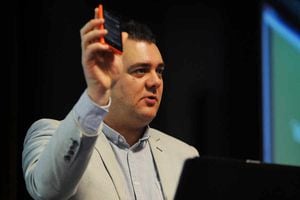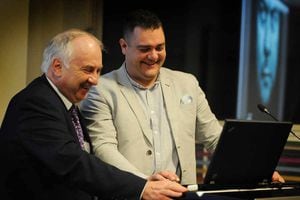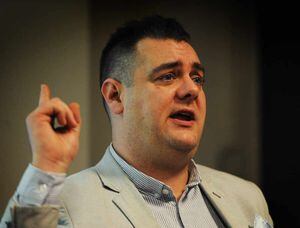WATCH: I can steal your home with a mobile phone: 'Britain's greatest fraudster' reveals tricks of his murky trade
It all started with joining a personal wifi hotspot at a popular cafe.

Then, within three months, Mr Smith had lost everything – including his home.
'Britain's greatest fraudster' Tony Sales gave a graphic demonstration to business leaders last night on how easy it is to find yourself in the same position as a victim of Cyber Crime.

He left his audience in shock as he spoke at the West Midlands Police and Crime Commissioner's Annual Business Summit.

Mr Sales went through step by step how a fraudster would go about targeting a victim, and the most frightening part was how easy it was to lose it all. He can literally steal your house from his mobile phone.

He can con someone into giving up their credit card details during a brief chat and clean out a bank account in a matter of seconds.
He knows how to target a victim, and how to cover his tracks once a crime has been committed.
Thankfully now retired from his criminal exploits, the king of the fraudsters is now assisting West Midlands Police in its efforts to tackle the growing problem of cyber crime.
And who are we to doubt his usefulness?
There is an argument - one that is not without merit - that the force should not be bringing in a convicted criminal to help them take on fraudsters.
But surely we are all better off if the shocking details Mr Sales revealed about his crimes are out in the open?
Such insider knowledge is invaluable to police in combatting an area of crime that is incredibly difficult to detect and prevent.
The complex nature of Mr Sales' elaborate scams are breathtaking. His background, which also includes overseeing loss prevention for a number of blue chip companies, is tailor-made for offering guidance on online fraud.
And we must accept that this is very much an area where criminals are acting with increasing regularity.
The Police and Crime Commissioner has admitted that these days we are as likely to be mugged online as in the street.
We think bringing Mr Sales on board was a bold and clever move.
Bringing crooks on board to fight crime is not a new tactic. It is a move that will always have its critics, but in the case of Tony Sales the benefits are clear.
If we can benefit from the expertise of those who have made careers out of swindling money out of the public, then so be it.
The demonstration started with Mr Smith, a made-up name, going for his regular coffee at Starbucks, and joining an open wifi network called 'Starbucks'. It would seem legitimate to all, but unbeknown to Mr Smith, the wifi network he joined was actually a personal hotspot set up by Mr Sales.
By joining the network, Mr Sales got access to Mr Smith's emails. From his emails Mr Sales got hold of Mr Smith's phone numbers from an online grocery shop receipt, and he learnt that Mr Smith was a keen shopper at a particular online website.
The following day, Mr Sales placed a call to Mr Smith's work pretending to be from his favourite shopping website. Cutting a five-minute conversation short, Mr Smith handed over his debit card details to part with £33 to get some vouchers for later discounts. He was told that the £33 would show up on his bill as a Post Office transaction because this new scheme was being run in conjunction with them.
Mr Sales paused here, and asked the audience why £33 and the Post Office connection? Nobody knew, but it was blindingly obvious when he said, £33 is the amount it costs with the Post Office to divert mail from one address to another for three months.
Now, Mr Sales was receiving all of Mr Smith's personal post and possessed his debit card and bank details.
Awake at the crack of sparrows, Mr Sales would filter out what he needed and drop the rest of Mr Smith's post back to his home before he got up in the morning.
He also created several IDs, including a passport and a BT bill for Mr Smith.
The aim at this point was clear for Mr Sales. "Other fraudsters may cash out here for £20,000 but I'm going to strip Mr Smith bare of everything he has," he announced to the room at Maple House.
He learns that Mr Smith is a builder, earning £500 a week, and is someone who likes to save his money.
He opens a bank account in his name slowly drips the money from one account to another then changes the address the bank has on file for Mr Smith.
Next he gets a phone for Mr Smith so as to help build his credit rating.
Mr Sales then buys a £40,000 Mercedes with £400 monthly repayments, sells the car to an offshore buyer for £20,000 and makes £17,500 profit after moving £2,500 into Mr Smith's account to cover the repayments for six months.
During the process of receiving Mr Smith's mail, Mr Sales discovered that Mr Smith only had £50,000 left to pay on his mortgage for his £450,000 suburban London home.
The bank offers 'Mr Smith' £300,000 to remortgage and, as Mr Sales announces with a grin, "within four hours Mr Smith has lost his home".
That was that, 15 minutes to explain how he could swindle someone out of thousands of pounds and their house – and that could have been any of us.
Thankfully for our livelihoods Mr Sales is retired now, but this type of scam is exactly what West Midlands Police have to deal with now, it is the changing face of crime.
Police and Crime Commissioner David Jamieson announced at the summit 'crime is changing, not falling'.





